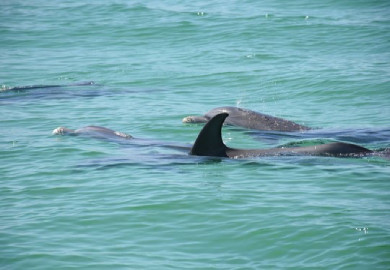SCDNR News
Boat carefully around South Carolina's marine mammals
CHARLESTON COUNTY, S.C.
March 18, 2022

As spring approaches and South Carolinians prepare for beach and boating weather, South Carolina Department of Natural Resources (SCDNR) officials are urging residents and visitors to safely share the waters with wildlife such as dolphins.
South Carolina is home to an estimated several hundred bottlenose dolphins, large, fish-eating mammals that can reach 12 feet in length and an average 400-600 pounds in weight. These intelligent animals are year-round residents of our nearshore coastal waters with a reputation for their curious natures – but it’s important to remember: dolphins are wild animals that should be admired from a distance, for the safety of both humans and dolphins.
Interactions with humans, including boat strikes and crab trap entanglements, are among the top causes of death for bottlenose dolphins in South Carolina.
According to federal guidelines, boaters must remain at least 50 yards from dolphins, porpoises and sea turtles and 100 yards from large whales. Fifty yards is equal to 150 feet – roughly the length of three semitrucks or half a football field.
Collisions between boaters and dolphins are more likely to occur in shallow waters, particularly in small tidal creeks and along marsh edges. Staying alert, following safe boating practices and maintaining lower speeds in these areas can reduce the risk of a collision.
Injured, stranded or dead dolphins should be reported immediately to the SCDNR wildlife hotline at 1-800-922-5431. If a boat accidentally collides with a dolphin, biologists ask that the boater stand by and immediately contact SCDNR or the U.S. Coast Guard on VHF Channel 16. Doing so provides biologists the best chance to help the animal and gather valuable scientific data.
Beachgoers play an important role in dolphin protection as well. Lowcountry dolphins practice a behavior called strand feeding – seen in only a few dolphin populations worldwide – in which the animals work in synchrony to herd fish onto the shoreline and beach themselves temporarily to catch their prey. This fascinating phenomenon can be interrupted by beachgoers who come too close. If you’re lucky enough to witness strand feeding from the shore, follow the same distancing requirements and give the animals a wide berth.
Bottlenose dolphins are protected under federal law by the Marine Mammal Protection Act of 1972, which makes it illegal to harass, hunt, capture or kill any marine mammal. Fines for feeding and/or harassing dolphins can reach up to $100,000.
For more information about safe interactions with dolphins and other marine mammals, visit NOAA Fisheries’ guidelines website.
For more information about participating in dolphin monitoring, reporting sightings and other ways to protect dolphins in South Carolina, visit the Lowcountry Marine Mammal Network’s website.

Tips for being dolphin friendly in South Carolina:
- Use caution when navigating in shallow waters and tidal creeks.
- Always heed "no wake" zones, operating boat at the lowest possible speed while maintaining steerage.
- Never feed dolphins. This teaches animals to approach boats and docks, putting them at greater risk of a boat strike, and it is illegal. Do not dispose of fish carcasses when dolphins are nearby.
- Never pursue, harass or interact with dolphins. It is dangerous for the animals and illegal.
- Report any wildlife violations to SCDNR’s 24/7 hotline: 1-800-922-5431.



